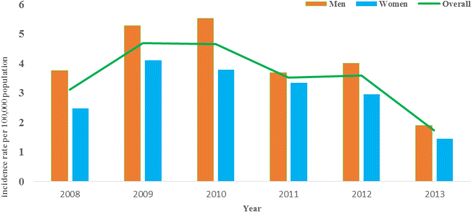Immediately modifiable risk factors attributable to colorectal cancer in Malaysia
- PMID: 28778191
- PMCID: PMC5544995
- DOI: 10.1186/s12889-017-4650-8
Immediately modifiable risk factors attributable to colorectal cancer in Malaysia
Abstract
Background: This study aimed to estimate potential reductions in case incidence of colorectal cancer attributable to the modifiable risk factors such as alcohol consumption, overweight and physical inactivity amongst the Malaysian population.
Methods: Gender specific population-attributable fractions (PAFs) for colorectal cancer in Malaysia were estimated for the three selected risk factors (physical inactivity, overweight, and alcohol consumptions). Exposure prevalence were sourced from a large-scale national representative survey. Risk estimates of the relationship between the exposure of interest and colorectal cancer were obtained from published meta-analyses. The overall PAF was then estimated, using the 2013 national cancer incidence data from the Malaysian Cancer Registry.
Results: Overall, the mean incidence rate for colorectal cancer in Malaysia from 2008 to 2013 was 21.3 per 100,000 population, with the mean age of 61.6 years (±12.7) and the majority were men (56.6%). Amongst 369 colorectal cancer cases in 2013, 40 cases (20 men, 20 women), 10 cases (9 men, 1 woman) or 20 cases (16 men,4 women) would be prevented, if they had done physical exercises, could reduce their body weight to normal level or avoided alcohol consumption, assuming that these factors are causally related to colorectal cancer. It was estimated that 66 (17.8%;66/369) colorectal cancer cases (42 men, 24 women) who had all these three risk factors for the last 10 years would have been prevented, if they could control these three risk factors through effective preventive measures.
Conclusions: Findings suggest that approximately 18% of colorectal cancer cases in Malaysia would be prevented through appropriate preventive measures such as doing regular physical exercises, reducing their body weight to normal level and avoiding alcohol consumption, if these factors are causally related to colorectal cancer. Scaling-up nationwide public health campaigns tailored to increase physical activity, controlling body weight within normal limits and avoid alcohol intake are recommended. Future studies with other site-specific cancers and additional risk factors are needed.
Keywords: Colorectal cancer; Malaysia; Population-attributable fraction; Risk factors.
Conflict of interest statement
Ethics approval and consent to participate
Ethics approval and consent were waived as this study was exclusively performed with the published data.
Consent for publication
Not applicable.
Competing interests
The authors declare that they have no competing interests.
Publisher’s Note
Springer Nature remains neutral with regard to jurisdictional claims in published maps and institutional affiliations.
Figures
Similar articles
-
[Preventability estimates for colorectal and breast cancer in Germany. A methodological evaluation of the risk factors alcohol and overweight].Bundesgesundheitsblatt Gesundheitsforschung Gesundheitsschutz. 2013 Mar;56(3):439-46. doi: 10.1007/s00103-012-1625-x. Bundesgesundheitsblatt Gesundheitsforschung Gesundheitsschutz. 2013. PMID: 23322150 German.
-
Preventability of Colorectal Cancer in Saudi Arabia: Fraction of Cases Attributable to Modifiable Risk Factors in 2015-2040.Int J Environ Res Public Health. 2020 Jan 2;17(1):320. doi: 10.3390/ijerph17010320. Int J Environ Res Public Health. 2020. PMID: 31906520 Free PMC article.
-
Burden of cancers attributable to modifiable risk factors in Malaysia.BMC Public Health. 2021 Feb 26;21(1):410. doi: 10.1186/s12889-021-10412-9. BMC Public Health. 2021. PMID: 33637056 Free PMC article.
-
Modifiable lifestyle factors that could reduce the incidence of colorectal cancer in New Zealand.N Z Med J. 2016 Dec 16;129(1447):13-20. N Z Med J. 2016. PMID: 27977648 Review.
-
The fractions of cancer attributable to modifiable factors: A global review.Cancer Epidemiol. 2016 Oct;44:203-221. doi: 10.1016/j.canep.2016.06.013. Epub 2016 Jul 25. Cancer Epidemiol. 2016. PMID: 27460784 Review.
Cited by
-
Mechanistic Insights on Microbiota-Mediated Development and Progression of Esophageal Cancer.Cancers (Basel). 2024 Sep 27;16(19):3305. doi: 10.3390/cancers16193305. Cancers (Basel). 2024. PMID: 39409925 Free PMC article. Review.
-
Prevalence and risk factors of colorectal cancer in Asia.Intest Res. 2019 Jul;17(3):317-329. doi: 10.5217/ir.2019.00021. Epub 2019 May 20. Intest Res. 2019. PMID: 31085968 Free PMC article. Review.
-
Knowledge, attitude and practice towards early screening of colorectal cancer in Riyadh.J Family Med Prim Care. 2020 May 31;9(5):2273-2280. doi: 10.4103/jfmpc.jfmpc_290_20. eCollection 2020 May. J Family Med Prim Care. 2020. PMID: 32754487 Free PMC article.
-
Dietary Patterns and Lifestyle Factors Associated with the Risk of Colorectal Cancer: A Hospital-Based Case-Control Study among Malaysians.Malays J Med Sci. 2024 Feb;31(1):212-234. doi: 10.21315/mjms2024.31.1.18. Epub 2024 Feb 28. Malays J Med Sci. 2024. PMID: 38456114 Free PMC article.
-
Knowledge and barriers to screening for colorectal cancer among individuals aged 40 years or older visiting primary healthcare clinics in Al-Khobar, Eastern Province.J Family Community Med. 2024 Jan-Mar;31(1):25-35. doi: 10.4103/jfcm.jfcm_291_23. Epub 2024 Jan 8. J Family Community Med. 2024. PMID: 38406224 Free PMC article.
References
-
- GLOBOCAN. Estimated cancer incidence, mortality and prevalence worldwide in 2012. http://globocan.iarc.fr/Default.aspx. Accessed 12 May 2016.
-
- Bray F. Transitions in human development and the global cancer burden. In: Wild CP, Stewart B, editors. World cancer report 2014. Lyon: International Agency for Research on Cancer; 2014.
-
- WCRF (The Worldwide Cancer Research Fund International). Worldwide data 2012. http://www.wcrf.org/int/cancer-facts-figures/worldwide-data Accessed 12 May 2016.
-
- Hassan MRA, Khazim WKW, Othman Z, Mustapha NRN, Said RM, Leong TW, et al. The second report of the national cancer patient registry-colorectal cancer, 2008–2013, Kuala Lumpur, Malaysia. 2014.
MeSH terms
LinkOut - more resources
Full Text Sources
Other Literature Sources
Medical


